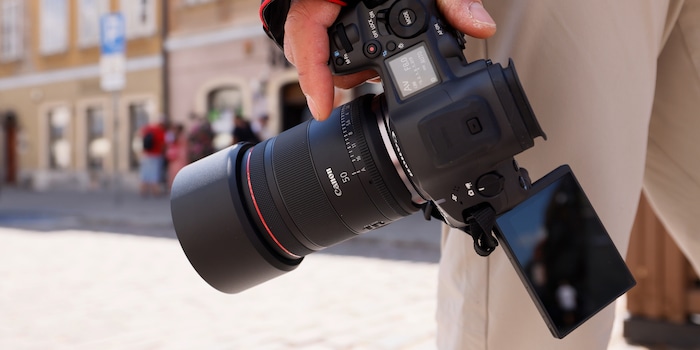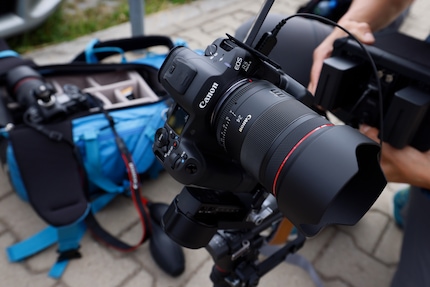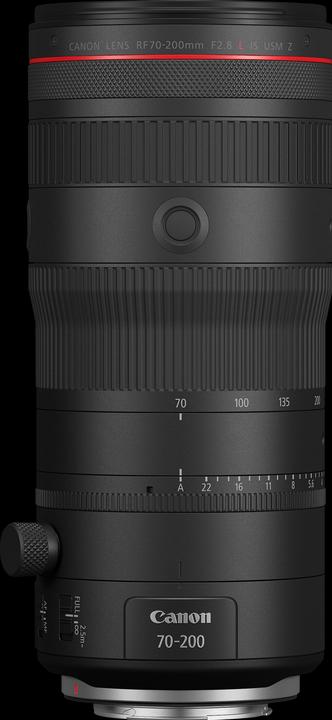

Four new lenses from Canon
Canon has introduced new lenses for its mirrorless cameras: the RF 24 mm F1.4 L VCM, the RF 50 mm F1.4 L VCM, the RF 70-200 mm F2.8 L IS USM Z and the RF-S 7.8 mm F4 STM Dual.
Canon is launching four new lenses on the market in November. With the RF 24 mm F1.4 L VCM and the RF 50 mm F1.4 L VCM, the manufacturer is expanding its range of premium fixed focal lengths. The other two lenses cover niche markets: The RF 70-200 mm F2.8 L IS USM Z is specially designed for hybrid applications, while the RF-S 7.8 mm F4 STM Dual is for stereoscopic 3D images.
New edition of two popular fixed focal lengths
In the summer, Canon launched the RF 35 mm F1.4 L VCM, the first lens in the new VCM series. It is designed to be equally suitable for photo and video recording, while remaining compact and delivering top image quality. This series is now being expanded to include two further focal lengths: the RF 24 mm F1.4 L VCM and the RF 50 mm F1.4 L VCM.
The two new lenses have exactly the same dimensions and key data as the 35 mm. Canon has installed two different motors inside: The "Voice Coil Motor" (VCM) is responsible for the focus. It is said to be even faster, more precise and quieter than the nano-ultrasonic motor (USM), which has taken over this task in previous lenses. The USM is now only responsible for compensating for focus breathing. To do this, it moves a second lens group in synchronisation with the focus motor and thus prevents the image section from changing.

Source: Canon
The speed of the new lenses of 1.4 enables a thin focal plane. An 11-blade iris diaphragm is intended to ensure an attractive bokeh. The RF 24 mm F1.4 L VCM weighs 515 grams, the RF 50 mm F1.4 L VCM 580 grams - significantly less than its EF predecessors or the 950 gram Canon RF 50 mm f/1.2L USM.
The new lenses will be available from November. The RF 24 mm F1.4 L VCM will cost 1549 francs or 1749 euros at launch, while the RF 50 mm F1.4 L VCM will cost 1449 francs or 1599 euros.
Tele with internal zoom for hybrid application
The new RF 70-200 mm F2.8 L IS USM Z complements the RF 24-105 F/2.8 L IS USM Z. The Z series is also aimed at people for whom video is just as important as photography. As with the VCM fixed focal lengths, there is also an aperture ring and focus breathing is reduced to a minimum. The lens is available in both white and black.
The image stabiliser is also optimised for video applications. For example, stabilised camera pans should remain smooth. The stabiliser in the lens compensates for up to 5.5 exposure levels, and up to 7.5 exposure levels on a body with a stabilised sensor.

Source: Canon
In contrast to the RF 70-200 mm f/2.8 L IS USM, the RF 70-200 mm F2.8 L IS USM Z has an internal zoom - so it does not extend when you change the focal length. This has the advantage that no dust or moisture can get in. However, lenses with an internal zoom are more difficult to transport because they cannot be retracted: The Z version is 19.9 cm long, the normal one only 14.6 cm. However, it is not much heavier (1115 grams vs. 1070 grams).
The RF 70-200 mm F2.8 L IS USM Z will be available from 14 November and costs 3179 francs or 3599 euros.
Stereoscopic lens for the R7
Canon announced the development of the RF-S 7.8 mm F4 STM Dual back in June. It can be used to create stereoscopic 3D images, for example for the Apple Vision Pro or the Meta Quest 3. The field of view of 63 degrees corresponds approximately to the human eye. The distance between the lenses is optimised for images of close objects.
The new lens for APS-C sensors is currently only compatible with the Canon EOS R7. It is aimed at semi-professional users. Operation should be correspondingly simple. After shooting, the EOS VR Utility app converts the image material into a spatial video.
The RF-S 7.8 mm F4 STM Dual will be available from November and costs 479 francs or 549 euros.
My fingerprint often changes so drastically that my MacBook doesn't recognise it anymore. The reason? If I'm not clinging to a monitor or camera, I'm probably clinging to a rockface by the tips of my fingers.
From the latest iPhone to the return of 80s fashion. The editorial team will help you make sense of it all.
Show all


